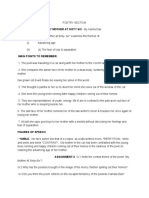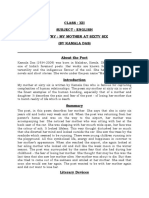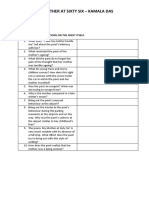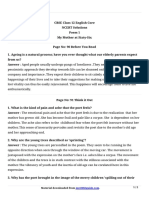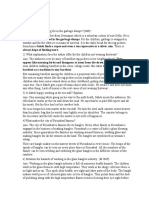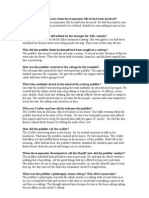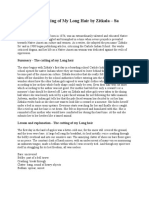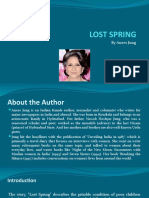My Mother at Sixty Six 2019-20
My Mother at Sixty Six 2019-20
Uploaded by
AnujCopyright:
Available Formats
My Mother at Sixty Six 2019-20
My Mother at Sixty Six 2019-20
Uploaded by
AnujOriginal Description:
Copyright
Available Formats
Share this document
Did you find this document useful?
Is this content inappropriate?
Copyright:
Available Formats
My Mother at Sixty Six 2019-20
My Mother at Sixty Six 2019-20
Uploaded by
AnujCopyright:
Available Formats
My Mother at Sixty Six (Assignment)
Kamala Das
Date: Date of submission:
S.No. Questions Marks
1. Driving from my parent’s
home to Cochin last Friday
morning, I saw my mother,
beside me,
doze, open-mouthed, her face
ashen like that
of a corpse and realized with pain
that she was as old as she looked but soon
put that thought away…
(a)Where was the narrator driving to? Who was sitting beside her?
Ans. The narrator was driving to the airport on her way to Cochin. Her mother was sitting next to
her.
(b) What did the narrator notice about her mother?
Ans. The narrator noticed that her mother had dozed off and she was looking old, pale and weak.
(c) Why did her mother’s face look like that of a corpse?
Ans. The mother looked old, pale and ashen. Since she had dozed off, with her mouth open, the
narrator felt she looked like a corpse in that condition.
(d) Find words from the passage which mean (i) Sleep lightly (ii) Dead body
Ans.(i) Dozed; (ii) Corpse
2. looked but soon
put that thought away, and
looked out at young
trees sprinting, the merry children spilling
out of their homes
(a)What did the narrator realize? How did she feel?
Ans. The narrator realized that her mother had grown old and would not be around for very long.
This thought pained her.
(b) What did she do then?
Ans. She started looking out of the car window in order to divert her attention to something else.
(c) What did she see outside?
Ans. She saw young trees moving fast as if they were sprinting and also saw young children happily
running out of their homes to play.
(d) Find words from the passage which mean (i) Running fast (ii) Happy
Ans.(i) Sprinting; (ii) Merry
3. but after the airport’s
security check, standing a few yards
away, I looked again at her, wan,
pale
as a late winter’s moon
(a)Name the poem and the poet.
Ans. The poem is ‘My Mother at Sixty-six’ and the poet is `Kamala Das’.
(b) What did the narrator do after the security check?
Ans. The narrator stood a few yards away and looked at her mother’s face again.
(c) Why did the narrator compare her mother’s face to a late winter’s moon?
Ans. The narrator’s mother is old, frail and very pale like the moon in late winter. Hence, the
comparison.
(d) Find words from the extract which mean the same as (i) Colourless (ii) Faded yellowish
Ans. (i) Pale; (ii) Wan
4. ….as a late winter’s moon and felt
that old
familiar ache, my childhood’s fear,
(a)What has been compared to a late winter’s moon?
Ans. The narrator’s ageing mother has been compared to the late winter’s moon.
(b) Why has the comparison been made?
Ans. The narrator’s mother looked old, frail and very pale like the moon in late winter. Hence, the
comparison.
(e) Identify the poetic device in the lines.
Ans. The poetic device used in the line ‘as a late winter’s moon’ is a simile.
(d) What is the ‘familiar ache’ mentioned in these lines?
Ans. It refers to the narrator’s childhood fear of losing her parent or fear of separation from her. 5.
but all I said was, see you soon, Amma, all I did was smile and smile and smile…’
(a)Why did the narrator say ‘see you soon, Amma’?
Ans. The narrator said this to reassure her mother and herself that she would see her soon. After
the pain of realizing that her mother had grown old, there is a mood of acceptance of reality.
(b) Why did the narrator smile and smile?
Ans. The narrator tries to put up a brave in front of her mother in order to hide her true feelings of
pain at seeing the old and weak condition of her mother.
(c) ‘Smile and smile and smile’ is a poetic device. Identify it.
Ans. It is repetition and has been used to emphasize the narrator’s acceptance of the fact that her
mother had aged and wouldn’t be around much longer.
(d) Amma is the fond way of addressing someone. Who is being addressed here?
Ans. The narrator’s mother is being addressed as ‘Amma’.
5. 5.old familiar ache, my childhood’s fear,
but all I said was, see you soon,
Amma, all I did was smile and smile and smile
(a) What does the phrase, ‘familiar ache’ mean?
(b) What was the poet’s childhood fear?
(c) What do the first two lines tell us about the poet’s feelings for her mother?
(d) What does the repeated use of the word, ‘smile’ mean?
Ans. (a) The phrase ‘familiar ache’ here means a persistent painful thought which has been nagging
about her frail old mother.
(b) The poet’s childhood fear was of losing her old and ageing mother one day.
(c) The first two lines tell us that the poet agonizes at the thought of her mother growing old and she
is trying to sound hopeful while bidding farewell to her mother.
(d) The repeated use of ‘smile’ indicates that she ran short of words, became emotional and was
trying to make an effort to hide her pain behind that smile.
6. ————-I saw my mother,
beside me,
doze, open-mouthed, her face ashen like
that
of a corpse and realised with
pain
(a) Who is ‘I’?
(b) What did ‘I’ realise with pain?
(c) Why was the realisation painful?
(d) Identify and name the figure of speech used in these lines.
Ans. (a) Here ‘ l’ is the poet.
(b) ‘I’, i.e. the poet realised with pain her ageing mother’s failing health and noticed her corps till pale
face.
(c) The realization was painful as she felt that her mother might not live long.
(d) The figure of speech is simile ‘ashen like that of a corpse’.
7. Driving from my parent’s
home to Cochin last Friday
morning, I saw my mother,
beside me,
doze, open-mouthed, her face
ashen like that
of a corpse and realised with
pain
(a) When and where was the poetess driving to?
(b) Who was sitting beside her? What did the poetess notice about her?
(c) What does the poetess compare her mother’s face with and why?
(d) Name the poem and the poetess.
Ans. (a) The poetess was driving from her parents home to the airport at Cochin on a Friday
morning.
(b) The mother of the poetess was sitting beside her. She noticed that her mother was dozing with
her mouth open. Then she realised that her mother had grown old.
(c) The poetess compares her mother’s face with a corpse, i.e. a dead body because her face has
lost the charm. It is pale, faded and lifeless.
(d) The poem is ‘My Mother at Sixty-six’ and is written by Kamala Das.
8. …that she was as old as she
looked but soon
put that thought away, and
looked out at Young
Trees sprinting, the messy children spilling
out of their homes,
(a) What did the poetess realise? How did she feel?
(b) What did the poetess do then?
(c) What did the poetess notice outside?
(d) Explain: “the merry children spilling out of their homes”.
(e) What do young sprinting trees signify?
(f) Which thoughts did the poetess put away?
Ans. (a) The poetess realised that her mother was old now. Her corpse-like ashen face made the
poet accept the fact that her mother was approaching her death. This realisation frightened the
poetess. She felt restless and disturbed.
(b) The poetess tried to change the thought of her mind and distract herself from the thoughts about
her ageing mother and so started looking out of the window.
(c) The poetess noticed young children playing outside. The young trees seemed moving rapidly in
the opposite direction of the moving car. These represent energy and youth in contrast to the thought
of old age and death.
(d) This refers to the image of young children rushing out of their homes to play. These children are
young, full of energy and happy. They are in direct contrast to the ageing mother.
(e) The young sprinting trees signify the active, cheerful, bright and energetic youth.
(f) The poet put away the thoughts of her mother who was getting old and the fear of losing her one
day.
9. I looked again at her, wan,
Pale
as a late winter’s moon and felt that
old
familiar ache, my childhood’s fear.
(a) Who do ‘I’ and ‘her’ refer to? How does ‘her face appear?
(b) What does the ‘familiar ache’ refer to?
(c) Name and explain the poetic device used in the second line.
Ans. (a) ‘I’ refers to the poet, Kamala Das, and ‘her’ refers to her mother. Her mother was very old a
herface appeared withered and pale.
(b) The ‘familiar ache’ refers to the poet’s childhood pain and fear of being separated from her
mother. Her mother’s old pale face made the poetess realise the fact of her eventual death.
(c) A simile has been used in the second line. Mother’s old pale face has been compared with pate
late winter’s moon to emphasise her withered face and gradual ageing.
10. ….. and felt that
Old
familiar ache, my childhood’s fear
but all I said was, see you soon,
Amma,
all I did was smile and smile and smile…
(a) What do the of the poetess parting words of the poetess suggest?
(b) Why did she ‘smile and smile’?
(c) Why did the poetess suppress her pain in the presence of her mother at the airport?
Ans. (a) The parting words suggest the optimism of the poetess. They console the mother that she
would return soon and give her a hope of survival.
(b) The poet smiled and smiled to conceal her fear and pain of separation from her mother. Again
the smile was to give an assurance of survival to the mother.
(c) The poetess didn’t want to increase the pain and agony of her mother, who must be feeling sad
while parting from her daughter. So she didn’t show her pain at the time of departure of her mother.
11. What poetic devices has the poet used in ‘My Mother at Sixty-six’?
Ans. The poem is rich in imagery. Devices of comparisons and contrasts are also used by the poet
to draw out the difference between youth and old age. She describes the mother’s face using similes
‘ashen like a corpse’, and ‘late winter’s moon’. The merry children playing happily are contrasted
with the old, weak and pale mother.
12. The poem, ‘My Mother At Sixty Six’, brings home the theme that ageing is a natural process
and is going to envelop one and all. Comment.
Ans. The narrator sees her mother dozing looking pale as a corpse. The mother’s pale face arouses
the narrator’s childhood fears of losing her mother but she cannot stay on. She accepts her mother’s
ageing as a natural process. She hides her pain and guilt under a smile. The narrator delves on the
complexities of life in which we have to strike a balance and sometimes part with our dear ones as
we have other commitments.
You might also like
- Roberta White A Studio of One's Own: Fictional Women Painters and The Art of FictionNo ratings yetRoberta White A Studio of One's Own: Fictional Women Painters and The Art of Fiction258 pages
- Solved Questions - My Mother at Sixty SixNo ratings yetSolved Questions - My Mother at Sixty Six4 pages
- Notes My Mother at Sixty-Six Important Questions Class 12 EnglishNo ratings yetNotes My Mother at Sixty-Six Important Questions Class 12 English4 pages
- Class: Xii Subject: English Poetry: My Mother at Sixty Six (By Kamala Das)No ratings yetClass: Xii Subject: English Poetry: My Mother at Sixty Six (By Kamala Das)3 pages
- 12 English Core Ncert Flamingo Poerty Ch01 My Mother at Sixty Six Ques100% (1)12 English Core Ncert Flamingo Poerty Ch01 My Mother at Sixty Six Ques2 pages
- Important Questions For CBSE Class 11 English Hornbill Chapter 1 - The Portrait of A LadyNo ratings yetImportant Questions For CBSE Class 11 English Hornbill Chapter 1 - The Portrait of A Lady6 pages
- The Third Level Model Questions and Answers: 1. Answer Each of The Following Questions in About 30-40 WordsNo ratings yetThe Third Level Model Questions and Answers: 1. Answer Each of The Following Questions in About 30-40 Words4 pages
- (CBSE BOARD 2023) The Interview - EnglishNo ratings yet(CBSE BOARD 2023) The Interview - English13 pages
- Class Xii English The Third Level Brief IntroductionNo ratings yetClass Xii English The Third Level Brief Introduction4 pages
- LOST SPRING - Textual Question - AnswersNo ratings yetLOST SPRING - Textual Question - Answers10 pages
- The Rattrap Important Questions CBSE Class 12 EnglishNo ratings yetThe Rattrap Important Questions CBSE Class 12 English6 pages
- The Third Level-Analysis: Questions and AnswersNo ratings yetThe Third Level-Analysis: Questions and Answers3 pages
- Chapter 1 Relation and Functions - Docx-ModifiedNo ratings yetChapter 1 Relation and Functions - Docx-Modified4 pages
- CBSE Class 12 English Report or Factual DescriptionNo ratings yetCBSE Class 12 English Report or Factual Description7 pages
- Part One - Greek Mythology: I.-Questions and AnswersNo ratings yetPart One - Greek Mythology: I.-Questions and Answers4 pages
- The British Restoration Period and The 18th Century and Absalom and AchitophelNo ratings yetThe British Restoration Period and The 18th Century and Absalom and Achitophel33 pages
- 21st Century Literature of The Philippines and The WorldNo ratings yet21st Century Literature of The Philippines and The World2 pages
- Culture and Literary Criticism in The 1930s and '40s.the Case of F.R. and Q.D. LeavisNo ratings yetCulture and Literary Criticism in The 1930s and '40s.the Case of F.R. and Q.D. Leavis17 pages
- Unit 5: W. B. Yeats: "An Irish Airman Foresees His Death"No ratings yetUnit 5: W. B. Yeats: "An Irish Airman Foresees His Death"14 pages
- HS Question Paper 2024 PDF Download English LinkNo ratings yetHS Question Paper 2024 PDF Download English Link7 pages
- Roberta White A Studio of One's Own: Fictional Women Painters and The Art of FictionRoberta White A Studio of One's Own: Fictional Women Painters and The Art of Fiction
- Notes My Mother at Sixty-Six Important Questions Class 12 EnglishNotes My Mother at Sixty-Six Important Questions Class 12 English
- Class: Xii Subject: English Poetry: My Mother at Sixty Six (By Kamala Das)Class: Xii Subject: English Poetry: My Mother at Sixty Six (By Kamala Das)
- 12 English Core Ncert Flamingo Poerty Ch01 My Mother at Sixty Six Ques12 English Core Ncert Flamingo Poerty Ch01 My Mother at Sixty Six Ques
- Important Questions For CBSE Class 11 English Hornbill Chapter 1 - The Portrait of A LadyImportant Questions For CBSE Class 11 English Hornbill Chapter 1 - The Portrait of A Lady
- The Third Level Model Questions and Answers: 1. Answer Each of The Following Questions in About 30-40 WordsThe Third Level Model Questions and Answers: 1. Answer Each of The Following Questions in About 30-40 Words
- Class Xii English The Third Level Brief IntroductionClass Xii English The Third Level Brief Introduction
- The Rattrap Important Questions CBSE Class 12 EnglishThe Rattrap Important Questions CBSE Class 12 English
- CBSE Class 12 English Report or Factual DescriptionCBSE Class 12 English Report or Factual Description
- Part One - Greek Mythology: I.-Questions and AnswersPart One - Greek Mythology: I.-Questions and Answers
- The British Restoration Period and The 18th Century and Absalom and AchitophelThe British Restoration Period and The 18th Century and Absalom and Achitophel
- 21st Century Literature of The Philippines and The World21st Century Literature of The Philippines and The World
- Culture and Literary Criticism in The 1930s and '40s.the Case of F.R. and Q.D. LeavisCulture and Literary Criticism in The 1930s and '40s.the Case of F.R. and Q.D. Leavis
- Unit 5: W. B. Yeats: "An Irish Airman Foresees His Death"Unit 5: W. B. Yeats: "An Irish Airman Foresees His Death"







